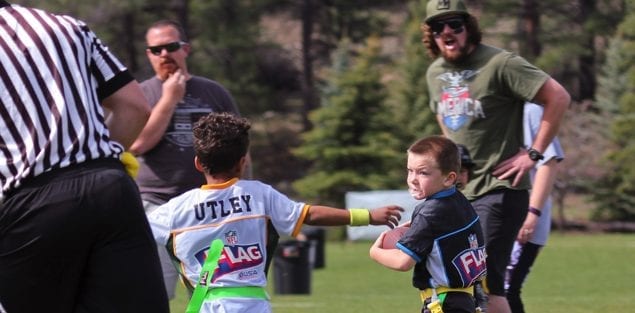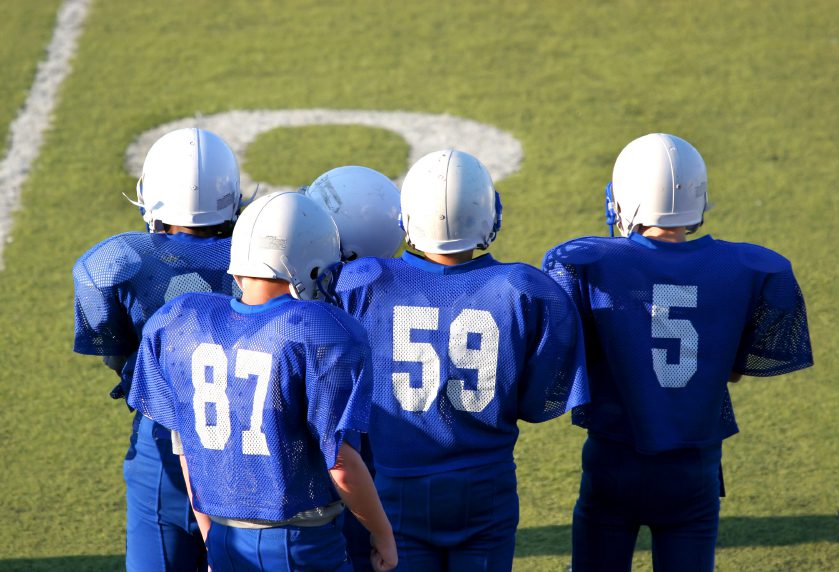10 Important Steps for Parenting Young Athletes

Posted in: Grade School, Hot Topics, Parenting Concerns, Teenagers
Topics: Child + Adolescent Development
Some parents on the sidelines at their children’s athletic events behave quite badly.
Also, the sun sets in the west.
In other words, the fact that parents get out of hand at their kids’ games isn’t exactly groundbreaking news. But unlike the widely accepted predictability of the sun’s behavior, we can’t afford to accept without question the damaging effects of this kind of parental behavior. We should work hard, for the sake of ourselves and especially for our children, to change this particular status quo.
Much of the time, we do. We roll our eyes and sometimes we might even say a few words to the poorly behaved mom or dad in the crowd. But research, as well as daily observations and national news reports, suggests that we now accept this behavior as part of the experience. That’s not OK.
So why do we let it continue?
Some have noted that there’s a stimulating contribution that these misbehaving parents provide for our dinnertime and barbecue discussions. I’ll admit that I’ve come home from my own kids’ games and unhelpfully recounted the antics of other parents in what is little more than an embarrassingly self-righteous tirade. It is mean-spirited, and I should know better. I suppose it is also a kind indirect apology for my own past transgressions. After all, I have on occasion too loudly voiced my frustration with the referee, or even the performance of my own child.
I’m human, like the rest of us.
This article might not tell you anything you haven’t already considered. By no means do I wish to suggest that I or anyone else is above getting inappropriately caught up in these moments. The desire for competition mixed potently with the tendencies to live through our kids’ experiences is the perfect storm for our acting in ways we might later regret. Watching your child make a perfect catch or pulling ahead in the last lap of the swim meet is uniquely inspirational. It is one of the joys of being a parent. It’s no wonder that parents can get carried away.
The problem, of course, is that getting too carried away is really bad for our kids.
If parents misbehave on the sidelines or in the stands, their child suffers. Kids who stick with athletics in this unfortunate setting tend to perform worse. They drop the catch that they could have easily made. They lose their stride in that final lap of the swim meet. Some kids who truly love their sport stop playing all together rather than choosing to endure these parental outbursts. There’s a lot of research to show this, but rather than citing the data, let’s do something a bit different. Let’s take advantage of all of the games, meets, and competitions that our readers are preparing to attend during the new school year and push reset on what we’ve come to expect.
We don’t need to behave this way. We are, after all, the adults in the arena.
With that spirit in mind, here are 10 things to remember as you and your children get ready for the wonderful world of athletic competition.
- Control yourself on the sidelines. The first step toward owning your behavior as a parent-spectator is to take note of your mindset even before the game starts. Think of it like road rage. Hardly anyone plans on engaging in road rage, but if you actively think to yourself that you will not participate in road rage before you start the car, the odds of your succumbing to poor impulses are much less likely. In the same way, remember that what you are about to watch is literally only a game. That’s what makes it fun. Don’t take that away by preparing for a fight even before things get started.
- Know that telling your child that you expect him or her to do better can be tricky. We all want our kids to perform well, but parental expectations are funny things. Constructive encouragement that is earnest can be misinterpreted, especially by the adolescent brain, as disappointment and disapproval. This is especially the case if you actively reference poor performances in past competitions. It is possible and important, however, to let your child know that you believe that he or she has learned from the previous events and has the capacity to improve. That’s a major aspect of mastering any athletic challenge.
- Accept that the officials are in charge. That’s really the only way to keep the game safe. If kids sense during the competition that you distrust or consistently disagree with the officials – and that includes coaches as well as referees and others in charge of the rules – then kids will stop following the rules. That means they stop playing the game, since games are by definition governed by rules. It goes without saying that coaches can make bad calls and line judges can misjudge a boundary. Let all of that go during the game. At home, you can sympathize with your child and even justify their disappointment if you think the calls were clearly off. Still, tolerating the imperfections of the people in charge is part of growing up. That’s the lesson you want to share.
- Talk about the game after the game. Some kids will want to discuss a game in detail after the event. Others will act like the game never happened. As we often say at the Clay Center for Young Healthy Minds, each child is wonderfully unique. Find out what works best for your kid.
- If things feel unsafe, get your kid out of the game. Some sporting events genuinely get out of hand. Referees miss important calls. The temperature in the arena can become unsafe. A parent might be so out of control that it no longer feels comfortable for the game to continue. Social psychologists warn us that large crowds make individuals reluctant to take corrective actions. If things feel unsafe, and if you have accurately assessed the situation, don’t hesitate to remove your child from the competition. Whatever damage you cause can be repaired much more easily than the risk of permanent damage in truly unsafe conditions.
- Be wary of the hyper-competitiveness that has come to characterize childhood athletic competitions. It makes little sense to spend every waking hour pursuing athletic greatness at the expense of other important developmental concerns. Even athletic geniuses need breaks to develop social skills, focus on academic achievement, and simply enjoy being young. Professional athletes often note that the willingness of their families to allow activities outside of sports helped in their ability to make friends, to fall in love, and to continue to enjoy and excel in the athletic competitions they love so dearly.
- It’s OK for your child to take a break or stop participating in athletics. For many reasons, your child might express the desire to stop competing in a sport that they have long appeared to enjoy. Avoid the word “quitting.” “Quitting” makes lots of us think of failure, and that’s not the message you want to give your young athlete. Find out why your child wants to stop. Find out if the sport is no longer interesting, or if things have become more competitive than he or she would like. See if there are alternatives. Maybe it’s time to stop the traveling team. Maybe the camaraderie of the neighborhood team is missed. Popular culture as well as academic research is full of anecdotes of extremely talented athletes who left their sports because the sports itself became too all-consuming.
- Remember the child in your house who might not be so into sports. Because athletics are so much a part of American culture, it can be lonely for the child who just isn’t that interested. If your child has not ever been and does not show interest in athletic competition, don’t worry. Encourage other interests, and remember to pay attention to the less athletic child if his or her sibling is an athlete. Attending a school play or a choral performance, or simply taking pleasure in your child’s time with you is every bit as important as watching a ball game. Again, this might seem obvious, but cultural practices suggest that many of us choose athletic events over other activities in which our children engage.
- Don’t overdo it with your nostalgic recollections. Many parents understandably take great pleasure in recounting the glory days of their own sports experiences. That’s fine, but keep it at a minimum with your kids. This is their sport now.
- Don’t forget that the goal of athletics isn’t exclusively to excel at the game. The goal also is to excel at being an athlete. That means taking pleasure in pushing your body to do things that you weren’t sure you could do, and understanding at the same time the limits of your body. These lessons will last a lifetime, long after the cleats are put away for good.
Of course, these things are much easier written down on paper than followed during the game.
Watching your child compete is one of the joys of parenting. It’s easy to lose track of your role when you get caught up in the game. I know I have.
I often say that I would, in a heartbeat, put a football helmet back on and take the field. I think I say this precisely because I know it’s not possible. Those days for me are passed, but we can enjoy the memories as we usher our children along the path toward becoming adults who make us proud.


 Share
Share Tweet
Tweet





